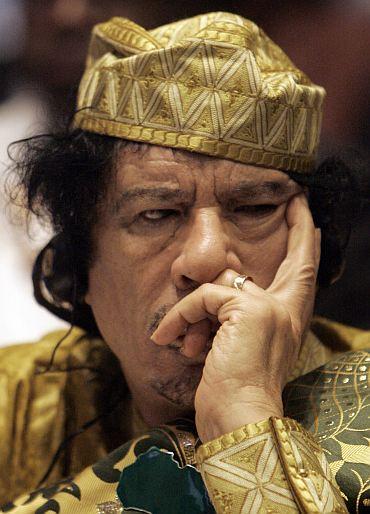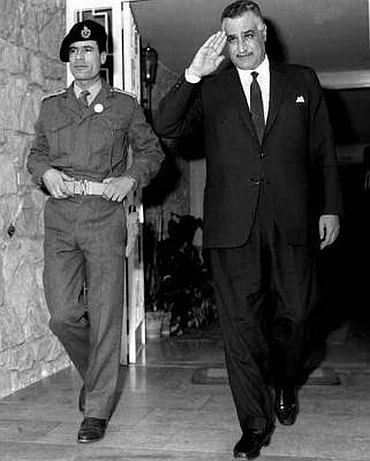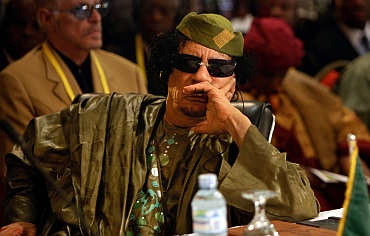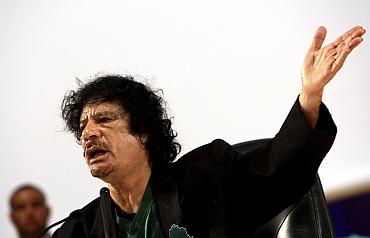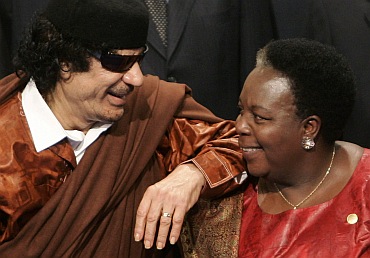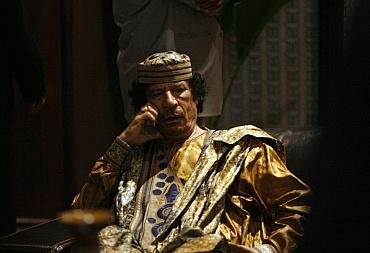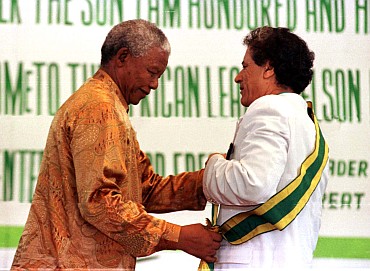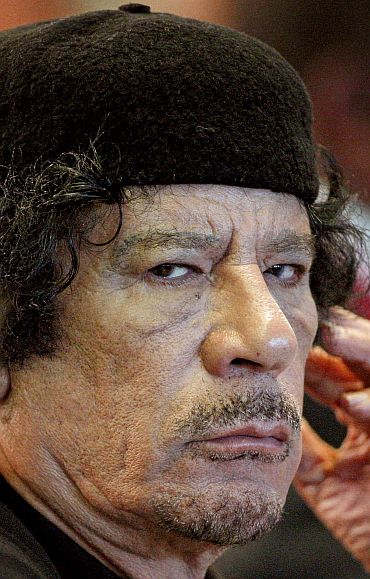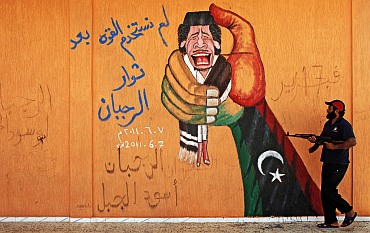 | « Back to article | Print this article |
Is this the end of Gaddafi's 42-year regime?
We take a look at Libya's Colonel Muammar Gaddafi, who has been Africa's and the Arab world's longest-ruling, most erratic leader, presiding for 42 years over this desert republic with vast oil reserves and just 6 million people.
Muammar al-Gaddafi was raised in a bedouin tent in the desert near Sirt. According to most conventional biographies, his family belongs to a small tribe of arabized Berbers, the Qadhadhfa.
Gaddafi attended a Muslim elementary school as a youth, during which time he was profoundly influenced by major events in the Arab world.
Gaddafi entered the Libyan military academy at Benghazi in 1961 and graduated in the 1965 66 period, along with most of his colleagues from the Revolutionary Command Council.
Gaddafi's association with the Free Officers Movement began as a cadet. The frustration and shame felt by Libyan officers at the time of Israel's defeat of the Arab armies on three fronts in 1967 fueled their determination to contribute to Arab unity by overthrowing the monarchy.
An early conspirator, Gaddafi began his first plan to overthrow the monarchy while in military college.
Click NEXT to read further
Is this the end of Gaddafi's 42-year regime?
His nephew, the Crown Prince Sayyid Hasan ar-Rida al-Mahdi as-Sanussi, was formally deposed by the revolutionary army officers and put under house arrest; they abolished the monarchy and proclaimed the Libyan Arab Republic.
He was fiercely anti-Western, and immediately ordered for a pullout of American and British military bases, including the Wheelus Air Base. He told Western officials that he would expel their companies from Libya's oil fields unless they shared more revenue.
In his statement, he threatened to do so only if Nasser told him to, indicating strong ties to Nasser. Because of his demands, oil companies changed their payments from 50-50 to 79-21 percent in favor of the government.
Click NEXT to read further...
Is this the end of Gaddafi's 42-year regime?
Gaddafi created Revolutionary committees to keep tight control over internal dissent in 1973. Ten to 20 percent of Libyans worked as informants for these committees, on par with programs in Saddam Hussein's Iraq and Kim Jong-il's North Korea. Surveillance took place in the government, in factories, and in the education sector.
The regime often executed dissidents through public hangings and mutilations and rebroadcast them on state television channels.
In 2011, Libya's press was rated as the most censored in the Middle East and North Africa. People who formed a political party were executed, and talking about politics with foreigners was punishable by up to 3 years in jail.
Arbitrary arrests were common and Libyans were hesitant to speak with foreigners.
Click NEXT to read further...
Is this the end of Gaddafi's 42-year regime?
During the 1970s, Libya executed members of the Islamism fundamentalist Hizb-ut Tahrir faction, and Gaddafi often personally presided over the executions.
Libya faced internal opposition during the 1980s because of its highly unpopular war with Chad. Numerous young men cut off a fingertip to avoid conscription at the time.[34] A mutiny by the Libyan Army in Tobruk was violently suppressed in August 1980.
From time to time Gaddafi responded to external opposition with violence. Gaddafi employed his network of diplomats and recruits to assassinate dozens of critics around the world. Amnesty International listed at least 25 assassinations between 1980 and 1987.
His revolutionary committees called for the assassination of Libyan dissidents living abroad in April 1980, sending Libyan hit squads abroad to murder them. On 26 April 1980 Gaddafi set a deadline of 11 June 1980 for dissidents to return home or be "in the hands of the revolutionary committees".
Gaddafi stated explicitly in 1982 that "It is the Libyan people's responsibility to liquidate such scums who are distorting Libya's image abroad.
Libyan agents have assassinated dissidents in the United States, Europe, and the Middle East.
Until 2004, Libya still provided bounties on critics, including $1 million for one journalist. During the 2005 civil unrest in France, Gaddafi called Chirac and offered him his help in quelling the resistors, who were largely North African.
Click NEXT to read furtherIs this the end of Gaddafi's 42-year regime?
After Nasser's death, Gaddafi attempted to become the leader of Arab nationalism. He wanted to create a "Great Islamic State of the Sahel", unifying the Arab states of North Africa into one.
As early as 1969, Gaddafi contributed to the Islamisation of Sudan and Chad, granting military bases and support to the FROLINAT revolutionary forces.
In 1971, when Muslims took power in Sudan, he offered to merge Libya with Sudan.
Sudan president Jaafar Nimeiry turned him down and angered Gaddafi by signing a peace settlement with the Sudanese Christians. Gaddafi took matters into his own hands in 1972, organizing the Islamic Legion, a paramilitary group, to arabise the region.
He dispatched The Islamic Legion to Lebanon, Syria, Uganda, and Palestine to take active measures to ensure Islamic control. As a side note, Gaddafi's occupation of Chad led to the liberation of French archeologist Fran oise Claustre in 1977.
In 1987, Gaddafi engaged in a full-out war with Chad, suffering a humiliating loss in 1987 during the Toyota War. Libya took heavy casualties, losing one tenth of its army (7,500 troops) and $1.5 billion worth of military equipment.
Chad lost 1,000 troops. After the war, former soldiers formed an Arab supremacist group, the Arab Gathering, contributing to violence in Sudan. Members of this group later developed into leaders of the Janjaweed.
Click NEXT to read furtherIs this the end of Gaddafi's 42-year regime?
In 1998, Gaddafi turned his attention away from Arab nationalism. He eliminated a government office in charge of promoting pan-Arab ideas and told reporters "I had been crying slogans of Arab Unity and brandishing standard of Arab nationalism for 40 years, but it was not realised.
That means that I was talking in the desert. I have no more time to lose talking with Arabs...I am returning back to realism...I now talk about Pan-Africanism and African Unity. The Arab world is finished...Africa is a paradise...and it is full of natural resources like water, uranium, cobalt, iron, manganese."
Gaddafi's state-run television networks switched from middle-eastern soap operas to African themes involving slavery. The background of a unified Arab League that had been a staple of Libyan television for over two decades was replaced by a map of Africa. Gaddafi sported a map of Africa on his outfits from then forward.
He also stated that, "I would like Libya to become a black country. Hence, I recommend to Libyan men to marry only black women and to Libyan women to marry black men."
Click NEXT to read further...Is this the end of Gaddafi's 42-year regime?
Gaddafi's strong military support and finances gained him several allies across the continent. He was bestowed the title of King of Kings of Africa in 2008, as he remained in power longer than any African king.
Gaddafi was celebrated in the presence of over 200 African traditional rulers and kings, although his views on African political and military unification received a lukewarm response from their governments.
His 2009 forum for African kings was canceled by the Ugandan hosts, who believed that traditional rulers discussing politics would lead to instability.
On February 1, 2009, a coronation ceremony in Addis Ababa, Ethiopia, was held to coincide with the 53rd African Union Summit, at which he was elected head of the African Union for the year.
When his election was opposed by an African leader, Gaddafi arranged with Silvio Berlusconi to have two escorts sent to that leader to have him change his mind. It worked, and he was elected Chairman of the African Union from 2009 to 2010.
Click NEXT to read further...Is this the end of Gaddafi's 42-year regime?
The 1988 bombing of the Pan Am flight over Lockerbie in Scotland is possibly the most well known and controversial international incident in which Gaddafi has been involved.
For three years, Gaddafi denied involvement, resulting in UN sanctions and Libya's status as a pariah state.
South African president Nelson Mandela, who took special interest in the issue, negotiated with the United States on Gaddafi's behalf. Mandela and Gaddafi had forged a close friendship starting with his release from prison in 1990.
Mandela persuaded Gaddafi to hand over the defendants to the Scottish Court in the Netherlands, where they faced trial in 1999. One was found not guilty and the other, Abdelbaset al-Megrahi, was given a life sentence.
For Gaddafi's cooperation, the UN suspended its sanctions against Libya in 2001.
Click NEXT to read further...
Is this the end of Gaddafi's 42-year regime?
Inspired by revolutions in Tunisia and Egypt, Libyans began to hold peaceful protests against his regime in February of this year.
Demonstrations were met with military force and the uprising escalated into a civil war, with North Atlantic Treaty Organisation-led forces later siding with the rebels.
On June 27, the brutal actions of the government were referred to the International Criminal Court and an arrest warrant for Gaddafi was issued for crimes against humanity.
Gaddafi repeatedly blamed the unrest on al-Qaeda and a "colonialist plot". He called those opposed to him "rats", and alleged that they had been influenced by "hallucinogenic drugs".
The war raged on for months, with slow gains for the opposition. Eventually, the rebels entered Tripoli on August 21.
